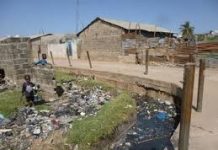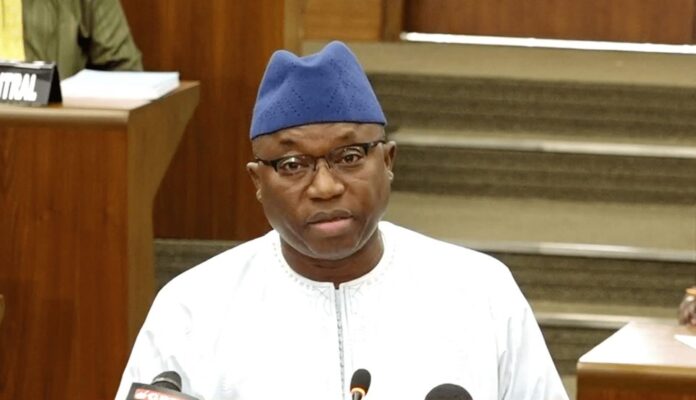By: Kebba AF Touray
The Gambia’s Finance Ministry has issued a press release on Monday 12th July 2021, disclosing that the government has set aside D10 million to respond to adverse effects of climate change.
The ministry said it is deeply concerned with the recent loss of lives and destruction of properties caused by the windstorm.
“As part of our national response to the adverse effects of climate change, a provisional amount of D10 Million was set aside in June of 2021 in order to respond to urgent circumstances and this amount will be scaled up after a full assessment is completed. However, we stand ready to support temporary interventions to alleviate the plight of the affected individuals during these difficult times,” the ministry said.
The ministry said the Gambian economy in 2020 marginally contracted by 0.2%, but was better than the economies of sub-Saharan countries, which recorded an average contraction of 3%, and that the country experienced a 62% drop in tourism arrivals, but this was offset by growth in agriculture and a boost in the construction sector, financed mainly by remittances inflows.
The ministry also indicated that the government stimulus package of D2.8 billion helped to stimulate economic activities and eased the impact on growth, adding that the economy is expected to grow by 4.9% in 2021 with some recovery in the tourism sector anticipated in the fourth quarter of this year.
“In 2020, revenue performance has been broadly in line with its pre-pandemic, target tax revenue was close to its pre-pandemic projections reaching D10.3 billion or 10.5% of GDP.
“The overall domestic revenue registered an actual of D13.5 billion, equivalent to 13.8% of GDP. During the peak of the pandemic, our development partners provided assistance in the form of budget support equivalent to 4.7% of GDP, or D4.6 billion.
“A lot of supportive policies were taken to dampen the impact of the pandemic including the 20 percent reduction of the CIF reference value of essential commodities and non-application of penalties for late filing of tax returns. Petroleum retail prices were highly subsidized in the first half of the year with a cumulative cost amounting to D135.1 million”, the ministry stated.
It also stated that the Government will continue to provide adequate response to the ongoing health pandemic, stressing that their development partners have been complementing the government’s efforts to achieve a COVID vaccination target of 60% of the country’s population.
The ministry said this effort will be supported mainly by the WHO and that the World has provided $8 million and they expect the supply of additional vaccine doses from the World Health Organization.
The ministry also said the government is planning for nationwide deployment of additional 70-life saving ambulances costing approximately D134 million.
This, the ministry disclosed, will be funded from government own resources as part of its response to the COVID pandemic, adding the government will soon disburse in July or early August the sum of D32 million to support the nationwide expanded immunization program.
“Furthermore, government will continue the cash transfer program by providing financial assistance to the most vulnerable communities of our population. Already, additional financing of $10 Million has been secured from the World Bank to extend the social assistance program to 36 months,” it stated.
Dilating on the expenditure front, the ministry stated that infrastructure financing from domestic resources has picked up significantly since the middle of last year, as most major primary and secondary roads across the country are funded from government resources and they include rural and urban roads such as the Banjul Road rehabilitation project, Hakalang road (84km), Sabach Sanjal- Bambali (38km), the Kaur loop of 48km, Basse-Yerobawol Road (13km) and Kaleng-Bushtown – Bansang (18km).
Stating further, the ministry disclosed that from January to June 2021, more than D1 billion has been disbursed against interim payment certificates in respect of consultancy services and civil works for the major roads.
“The 39km civil works for Kiang Sankandi- Karantaba road will commence in July and is expected to complete in 12 months-time. Other major construction works include the Basse and Brikama Markets which have an estimated combined cost of more than D145 million,” it stated.
“Our external financiers also provided funding for the construction of the bridges in Basse and Passamas and the 51km Basse to Koina Road. The confirmation of financing for the widening of Bertil-Herding Highway is very advanced and the procurement of the services of a contractor will soon be finalized. The 50km secondary roads within the Greater Banjul Area will commence shortly.”
In an effort to target one of the most vulnerable communities, the Finance Ministry said the government decided to maintain the price of fertilizers at D700 per 50kg for a second year in a row despite rising fertilizer prices in the international market.
It said this subsided price translates to a cost to the government of D524M for this farming season compared to a subsidy of D201M in 2020. In addition, the groundnut subsidy for 2020/2021 cropping season amounts to D56.6 million.
“To improve public financial management, government decided to roll out the integrated financial management information system to all Local Government Authorities, Statutory Government Agencies and Self-Accounting projects,” the ministry stated.
It further said at the moment, all LGA are connected to the IFMIS but face internet challenges that should be addressed in order to maximize the benefits of the system.
“Furthermore, there are plans to roll out the system to the remaining projects and statutory agencies. This effort will help to improve the quality of financial statements and enhance the monitoring and statutory reporting requirements of these institutions,” it stated.
Despite all these investments, the ministry stressed that the government debt ratio shows a declining trend since 2016 reaching a level of 77.2% of GDP in 2020 compared to a level of 118% of GDP in 2016.
“The sustained fiscal consolidation efforts complemented by development partners have helped to maintain macroeconomic stability. Even though the current debt level is classified as high risk of debt distress, the overall public debt is deemed to be sustainable. The current debt policies shall be maintained and reviewed periodically to assess its appropriateness to future circumstances,” the ministry lamented.
In view of their stable and favorable macroeconomic outcomes, the finance ministry stated that the International Monetary Fund has been continuously assessing the nation’s economic policies, and this has led to the successful completion of two reviews leading to the disbursements of $28 Million and $14.4 Million in January and May of 2021.
“The next IMF review of our economic performance is expected in September 2021. The European Union also assessed our performance and accordingly disbursed €5.5 million in June 2021.”






















